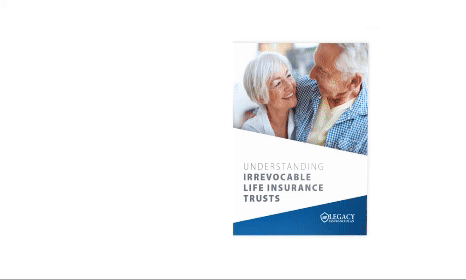Life insurance isn't just a tool for financial security. For many Americans, it's a cornerstone of a meticulously crafted estate plan. By integrating life insurance into your estate planning strategy, you can ensure that a wide array of goals, such as sustaining your family business or financing your child's college education, are met even in your absence.
How can life insurance benefit my estate plan?
Life insurance, a financial tool that we associate with supporting loved ones in the event of sudden death, can be a game-changer when integrated into estate planning. Life insurance can provide numerous benefits related to estate planning that include immediate liquidity and asset equalization among heirs; paying debts and taxes; protecting a family business; establishing a legacy; and providing for special needs dependents.
Why is liquidity important?
Upon your passing, your beneficiaries will likely face immediate financial obligations, ranging from funeral expenses to outstanding debts and legal expenses. Life insurance can provide your heirs with an immediate inflow of funds, ensuring they aren’t forced to sell valuable assets hastily or at an inopportune time. If your estate exceeds the federal estate tax exemption limit, your heirs may be burdened with a substantial tax bill. The death benefit from a life insurance policy can be used to pay these taxes, shielding your other assets from potential sales to cover the tax liability.
Can life insurance equalize inheritances?

Besides liquidity, life insurance provides an opportunity to even things out among loved ones. If you have multiple beneficiaries and diverse assets like a family business or property, not all assets can be easily divided. A life insurance policy can equalize inheritances, ensuring each beneficiary receives an equitable share. For instance, if one child inherits the family business, other children can be compensated through life insurance proceeds. If you own a family business, life insurance also could provide the funds required for co-owners or heirs to purchase the deceased's interest in the business, ensuring continuity.
How can life insurance impact your legacy?
Legacy planning is all about ensuring your values, wishes and assets get passed down to the next generation or toward causes you believe in. Life insurance, often overlooked in legacy discussions, can be a powerful tool for this purpose. If philanthropy is a part of your legacy wish, you can name a charitable organization as the beneficiary of your life insurance policy. This guarantees a significant donation, fostering goodwill and possibly creating an enduring fund or program in your name. This approach not only ensures continued support for causes close to your heart but might also provide potential estate tax benefits.
How can life insurance benefit a dependent with special needs?
Dependents with special needs often require a lifetime of specialized care, therapies, medications and assistive devices. Life insurance proceeds can provide the financial resources necessary to ensure that the dependent's care continues uninterrupted, even after the primary caregiver or breadwinner passes away.
Life insurance also is an important financial tool if you have a dependent with special needs. Many individuals with special needs qualify for government assistance programs. Properly structured, a life insurance policy can fund a special needs trust upon the death of the policyholder. This trust can provide supplemental financial resources without jeopardizing the individual's eligibility for government benefits.
For parents and guardians of individuals with special needs, one of their biggest concerns is what will happen to their dependent after they're gone. A life insurance policy can provide peace of mind knowing that there's a financial safety net in place.
What is an ILIT?

An irrevocable life insurance trust, or ILIT, is a trust specifically designed to hold and own a life insurance policy. Once the trust is established and the policy is transferred into it, the trust becomes the policy owner, while the insured person gives up any rights to the policy. The nature of the trust is "irrevocable," meaning it can't be dissolved or modified without the consent of the beneficiaries.
A primary reason for establishing an ILIT is to remove the life insurance proceeds from the insured's taxable estate. If structured properly, the death benefit from the life insurance held in an ILIT will not be included in the deceased's gross estate and will be free from federal estate taxes.
With an ILIT, the grantor (the person creating the trust) can set specific terms about how and when the life insurance proceeds will be distributed. This is useful if there are concerns about beneficiaries' ability to manage large sums or if the goal is to provide long-term financial support.
Also, since the assets inside an ILIT are not owned by the insured, they can be shielded from the insured's creditors. This makes ILITs a beneficial vehicle for those seeking to protect their life insurance benefits from potential creditors or legal actions.
An ILIT can be structured as a "generation-skipping trust," allowing the death benefits to pass on to the second generation (grandchildren) without incurring any federal estate or generation-skipping transfer taxes. This is especially beneficial for high-net-worth individuals looking to transfer significant assets across generations.
In addition to the numerous tax benefits, ILITs also provide a range of non-tax advantages, such as protecting the policy from potential mismanagement by beneficiaries or ensuring that the proceeds are utilized according to the grantor's specific wishes.
ILITs can also be integrated into a charitable giving strategy. For example, the ILIT can be set up to provide income to beneficiaries for a certain period, after which the remainder goes to a charity.
In scenarios where significant assets are given to charity, an ILIT can replace the wealth that's been donated. The life insurance proceeds can ensure that heirs still receive an inheritance equal to or greater than the value of the charitable gifts.
While the ILIT itself is irrevocable, it can hold various types of life insurance policies, be it term, whole or universal life, offering flexibility in premium payments and coverage amounts.
Keep in mind, however, that once you set up an ILIT, the decision is final. You lose control over the policy, and you can't change the beneficiaries or terms of the ILIT without their consent. If you transfer an existing life insurance policy to an ILIT, and you die within three years of the transfer, the policy proceeds might still be included in your taxable estate. Ideally, a new policy should be taken out in the name of the ILIT to avoid this rule. To avoid any gift tax issues or policy lapses, premiums must be paid in a timely manner, often through the grantor gifting the ILIT each year, which then pays the premium.
How can life insurance help maintain a family business?

The sudden demise of a key figure in a family business can create a vacuum, potentially leading to financial instability. Life insurance can provide the necessary capital to keep the business running smoothly during transitional periods, ensuring salaries are paid, rents are met and operations continue unhindered.
Businesses often accumulate debts, which need to be serviced regularly. If a significant family member who was instrumental in managing these liabilities passes away, life insurance can step in to cover these debts, preventing assets from being liquidated or the business from being sold.
In family businesses with multiple stakeholders, buy-sell agreements are common. These agreements outline how a partner's share will be managed if they pass away. Life insurance can fund these buyouts, ensuring that the deceased's family receives fair compensation without straining the business' finances.
In scenarios where the deceased was a major contributor to the business' revenues, their absence can create a significant financial void. A life insurance policy can provide a temporary financial buffer until the business can recalibrate or find a suitable replacement.
Some business loans have clauses that allow lenders to demand immediate repayment upon the death of a key business figure. Life insurance proceeds can be used to repay such loans, ensuring that the business remains solvent.
Not all heirs might be interested in running the family business. As mentioned, life insurance can serve as a tool to equalize inheritances, allowing certain family members to inherit the business while others receive a comparable amount from the life insurance payout.
Certain types of life insurance policies can be used as collateral for business loans. This can be invaluable for family businesses looking to expand or navigate through temporary financial challenges.
The death of a key figure can lead to uncertainty among employees. The payout from a life insurance policy can be used to offer bonuses, raises or other incentives to retain crucial employees during transitional periods.
Having life insurance inherently promotes a culture of forward planning and risk mitigation within the family business context. It drives home the importance of being prepared for all eventualities.
How does life insurance provide peace of mind?
Perhaps the most intangible yet valuable benefit is the peace of mind knowing your loved ones will be financially secure, regardless of life’s unpredictability. For many people, the foremost purpose of life insurance is to ensure that, in the event of your untimely demise, your dependents continue to lead a comfortable life. This is especially crucial if you are the primary breadwinner. The death benefit can replace lost income, ensuring that your family maintains their current lifestyle.
Life is unpredictable, filled with unknowns and uncertainties. Life insurance, in many ways, is an antidote to these uncertainties. By providing a safety net for various life scenarios, it allows individuals to live with the confidence that, come what may, their financial plans and the well-being of their loved ones are secured. It's not just about mitigating risks — it's about living with serenity and assurance in the present.
Conclusion
Life insurance is not just a financial product; it’s a strategic component of a comprehensive estate plan. By understanding and leveraging its multifaceted advantages, you can create a robust, flexible and forward-thinking estate plan that safeguards your legacy and ensures your wishes are realized. Consulting with financial and legal experts can help tailor a life insurance strategy that seamlessly integrates with your broader estate goals.



